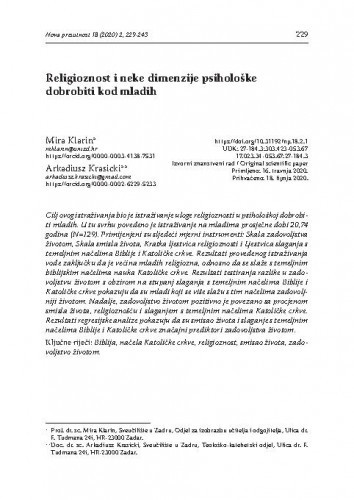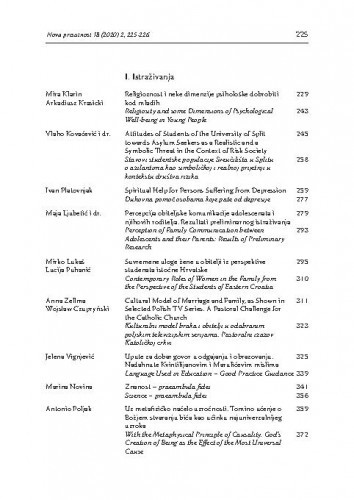The aim of this research study was to investigate the role of religiosity in the psychological well-being of young people. For that purpose, a research study was conducted among young people of the average age of 20.74 (N=129). The following measurement instruments were applied: Life Satisfaction Scale, Purpose in life Scale, Short Religiosity Scale, and the Scale of Agreement with the Basic Principles of the Bible and the Catholic Church. The results of the conducted study lead to the conclusion that the majority of young people are religious, i.e. that they agree with the basic biblical principles of the teachings of the Catholic Church. The results of the testing with regard to the difference in life satisfaction with reference to the level of agreement with the basic principles of the Bible and the Catholic Church indicate that the young people who agree with those principles to a greater extent are more satisfied with their life. Furthermore, life satisfaction has a positive correlation with the estimation of the purpose in life, religiosity, and the agreement with the basic principles of the Catholic Church. The results of the regression analysis indicate that the purpose in life and the agreement with the basic principles of the Bible and the Catholic Church are significant predictors of life satisfaction.; Cilj ovog istraživanja bio je istraživanje uloge religioznosti u psihološkoj dobrobiti mladih. U tu svrhu povedeno je istraživanje na mladima prosječne dobi 20,74 godina (N=129). Primijenjeni su sljedeći mjerni instrumenti: Skala zadovoljstva životom, Skala smisla života, Kratka ljestvica religioznosti i Ljestvica slaganja s temeljnim načelima Biblije i Katoličke crkve. Rezultati provedenog istraživanja vode zaključku da je većina mladih religiozna, odnosno da se slaže s temeljnim biblijskim načelima nauka Katoličke crkve. Rezultati testiranja razlike u zadovoljstvu životom s obzirom na stupanj slaganja s temeljnim načelima Biblije i Katoličke crkve pokazuju da su mladi koji se više slažu s tim načelima zadovoljniji životom. Nadalje, zadovoljstvo životom pozitivno je povezano sa procjenom smisla života, religioznošću i slaganjem s temeljnim načelima Katoličke crkve. Rezultati regresijske analize pokazuju da su smisao života i slaganje s temeljnim načelima Biblije i Katoličke crkve značajni prediktori zadovoljstva životom.
Sažetak

 Nova prisutnost : časopis za intelektualna i duhovna pitanja : 18, 2(2020) / glavna i odgovorna urednica, editor-in-chief Katica Knezović.
Nova prisutnost : časopis za intelektualna i duhovna pitanja : 18, 2(2020) / glavna i odgovorna urednica, editor-in-chief Katica Knezović.